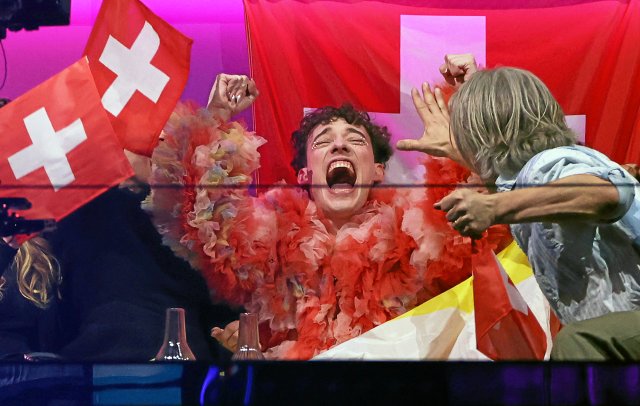Hurray, Nemo: No non-binary person has ever won the ESC before.
Photo: dpa/Jens Büttner
The most sensational and intelligent song of the Eurovision Song Contest 2024 has won! There has never been anything like “The Code” by Nemo from Switzerland at the ESC. The song is proof of the quality the ESC contributions can achieve. A mixture of opera quotes, drum’n’bass, Eurodance and hip-hop. And although the song has the classic structure of a pop song, when you listen to it you feel like you are constantly entering new sound corridors. And what an incredible voice Nemo has: the high Magic Flute phrases of the song are actually performed live without any problems – unbelievable.
No non-binary person has ever won the ESC before. And how she managed to stay on a rotating disk during her performance and still hit all the notes remains a mystery. The song is about there being more than 0 and 1 or black and white. A statement worthy of the liberal and glittering, colorful spirit of the ESC. Especially this year. The visibly disappointed Croatian Baby Lasagna came in second with his song “Rim Tim Tagi Dim”, which dominated the betting odds for a long time. The duo Alyona Alyona and Jerry Heil from Ukraine took third place with the pompous song “Teresa & Maria”. The song “Always on the Run”, which was strongly performed by the German participant Isaak, reached the solid midfield with 12th place. The juries in particular honored Isaak’s performance. The audience vote, on the other hand, was poor.
The day of the final started with a bang. The Dutch “Friesenjung” Joost Klein was disqualified for allegedly assaulting a camerawoman just a few hours before the start of the final. His contribution “Europe” was one of the favorites. The fan base reacted to the expulsion with corresponding polarization. Whatever Joost Klein did, his feather-light Europop was missing from the finale.
This time, the ESC motto “united by music” could easily have been replaced by “divided by politics”. The European Broadcasting Union (EBU) has been trying for years to pretend that the ESC is apolitical. But he never was. Be it the exclusion of Belarus and Russia, the commitment to tolerance and peace or the extremely queer climate, the ESC has always been shaped by current political events and discourses. This time the war in Gaza weighed heavily on the spectacle. The very fact that the EBU allowed Israeli singer Eden Golan to take part caused strong protests from other participants.
Golan’s team had to change the song’s title and lyrics. The original title “October Rain” was understood as a reference to the Hamas terrorist attack on Israel on October 7th last year. The EBU statutes do not allow political statements. In the final version the song was called “Hurricane”. In Iceland it was considered whether one could even take part in the ESC under these circumstances.
There have been massive protests in Malmö since the start of the semifinals. Six to eight thousand people protested in the city against Israeli participation, some with extremely ugly slogans. Instead of a party atmosphere, there was an aggressive, heated climate in Malmö. Of all people, climate activist Greta Thunberg exacerbated the ESC climate catastrophe with her participation in the protests. Her mother, the opera singer Malena Ernman, who performed at the ESC in Russia in 2009, had previously co-initiated a Swedish artists’ initiative against Israel.
The hotel where Eden Golan was staying was besieged by several hundred demonstrators. At the press conference for the second semifinal, the Greek participant Marina Satti demonstratively displayed her dislike for Eden Golan in the style of a petulant five-year-old child. Unlike Joost Klein, she was not disqualified for her inappropriate behavior. Even the presence of the Swedish Crown Princess Victoria did not prevent whistles and boos against the Israeli entry in the final. Some audience members even left the hall during Golan’s performance. Palestine flags were banned in the hall, and some spectators showed them on their cell phones. “Hurricane” only received a few points from the juries in the final. It was only the viewer voting that catapulted the Israeli contribution to 5th place. This was above all a show of solidarity.
Despite all these problems, the almost four-hour-long finale ran smoothly. What will definitely be remembered is the live exorcism of Irish participant Bambi Thug, during which the children in the audience probably covered their eyes in fear. It’s also a shame that the original empowerment-promiscuity anthem “Zorra” (German: “Slut”) by the Spanish senior interpreter Nebulossa was overlooked by the juries and television viewers. In Malmö the entire hall sang along.
With 12th place for “Always on the Run” by Isaak, the series of last or penultimate places for German participants that has lasted for many years seems to have finally been broken. For years, the NDR has been working, sometimes very courageously and sometimes rather despondently, on a concept to place a German participant back in the top ranks of the ESC. Last year, this was tried with a Tiktok vote, which then swept the drinking song singer Ikke Hipgold into the German preliminary round on his own sangria wave. His victory was just prevented by the jury vote. Instead of him, the dark birds of paradise from Lord of the Lost went to the ESC with their song “Blood and Glitter” – and took last place. Wrongfully so, because this song was an excellent contribution.
This also left the NDR perplexed. Instead of Tiktok, the station tried this year with the casting show “I want to go to the ESC” hosted by Conchita Wurst and Rea Garvey. A friendly format that was also easy to use on social media, even if its winner Foryan only came second to last in the German preliminary round. The fact that the German contribution was able to place better in Malmö this year is mainly due to the impressive performance of the singer Isaak. However, the contest as a whole is still treated rather neglected by the German media. The contributions to the preliminary decision hardly get any airplay, the reporting is ironic and the programs about the ESC are pushed to late broadcast slots or relegated to special interest channels.
Thorsten Schorn, who replaced ESC veteran Peter Urban as commentator for the German viewers, did a confident job. The two Swedish presenters Petra Mede and Malin Åkerman accompanied the television viewers through the always somewhat shallow moderation texts with their traditional stateswoman-like wooden demeanor. On the fiftieth anniversary of their victory at the Grand Prix in Brighton, Abba even briefly appeared on the stage as equally wooden-looking avatars and sang their still fresh-looking winning title from 1974, “Waterloo”. And Conchita Wurst was allowed to sing along to Abba with Charlotte Perrelli and Carola on the tenth anniversary of her ESC victory.
#ndstays – Get active and order a promotional package

Regardless of whether it is pubs, cafés, festivals or other meeting places – we want to become more visible and reach everyone who values independent journalism with an attitude. We have put together a campaign package with stickers, flyers, posters and buttons that you can use to get active and support your newspaper.
To the promotional package
judi bola sbobetsbobet88judi bola sbobet88 judi bola
